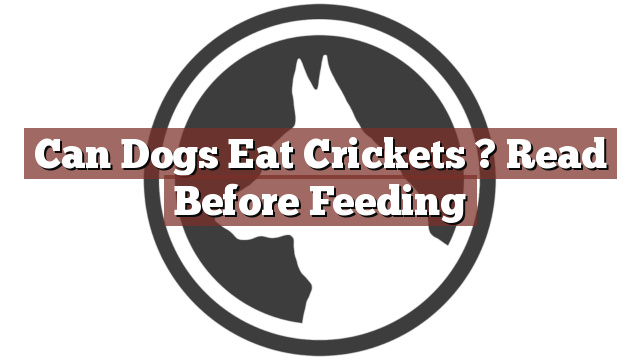Understanding Your Dog’s Dietary Needs
As a responsible pet owner, it is crucial to be aware of your dog’s dietary needs. Providing a well-balanced diet is essential for your furry friend’s overall health and well-being. While dogs are primarily carnivorous animals, they can also benefit from certain fruits, vegetables, and even insects. However, it is important to exercise caution and thoroughly research before introducing any new food into your dog’s diet.
Can Dogs Eat Crickets? Read Before Feeding
Can dogs eat crickets? The answer is yes, dogs can eat crickets. Crickets are safe for most dogs to consume and can even offer some health benefits. However, it is important to consider a few factors before incorporating crickets into your dog’s diet.
When feeding crickets to your dog, it is crucial to ensure that the crickets are sourced from a reliable and reputable supplier. This is to avoid any potential contamination or exposure to harmful pesticides, which can pose a risk to your dog’s health. Additionally, it is vital to feed your dog cooked or dried crickets, as raw crickets may carry parasites that can cause health issues.
Pros and Cons of Feeding Crickets to Dogs
Feeding crickets to your dog can have both advantages and disadvantages. Let’s explore the pros and cons of incorporating crickets into your dog’s diet:
Pros:
- Nutritional Value: Crickets are rich in protein, fiber, and essential vitamins such as B12 and iron. These nutrients can support your dog’s overall health, promote muscle development, and boost their immune system.
- Allergen-friendly: Crickets are a hypoallergenic protein source, making them a suitable alternative for dogs with common food allergies or sensitivities.
- Environmental Sustainability: Compared to traditional livestock farming, cricket farming requires significantly less water, land, and feed. By feeding your dog crickets, you are contributing to a more sustainable and eco-friendly food choice.
Cons:
- Potential Allergies: While rare, some dogs may have allergies to crickets. It is important to monitor your dog closely for any signs of an allergic reaction, such as itching, swelling, or digestive issues, and consult your veterinarian if needed.
- Quality Control: Ensuring the quality and safety of the crickets is crucial. It is essential to purchase crickets from trusted sources and check for any signs of contamination or spoilage before feeding them to your dog.
- Dietary Imbalance: While crickets can be a healthy addition to your dog’s diet, they should not replace a well-balanced meal. It is important to consult with your veterinarian to determine the appropriate portion size and frequency of cricket consumption for your dog.
Conclusion: Weighing the Benefits and Risks of Cricket Consumption for Dogs
In conclusion, dogs can eat crickets as part of a balanced diet. Crickets offer various nutritional benefits and can be a suitable alternative for dogs with food allergies. However, it is essential to exercise caution and ensure that the crickets are sourced from a reputable supplier to prevent any potential health risks. As always, consulting with your veterinarian is crucial to determine the appropriate dietary choices for your dog and to address any individual concerns or dietary restrictions they may have.
Thank you for taking the time to read through our exploration of [page_title]. As every dog lover knows, our furry friends have unique dietary needs and responses, often varying from one canine to another. This is why it's paramount to approach any changes in their diet with caution and knowledge.
Before introducing any new treats or making alterations to your dog's diet based on our insights, it's crucial to consult with a veterinarian about [page_title]. Their expertise ensures that the choices you make are well-suited to your particular pet's health and well-being.
Even seemingly harmless foods can sometimes lead to allergic reactions or digestive issues, which is why monitoring your dog after introducing any new food item is essential.
The content provided here on [page_title] is crafted with care, thorough research, and a genuine love for dogs. Nevertheless, it serves as a general guideline and should not be considered a substitute for professional veterinary advice.
Always prioritize the expert insights of your veterinarian, and remember that the health and happiness of your furry companion come first.
May your journey with your pet continue to be filled with joy, love, and safe culinary adventures. Happy reading, and even happier snacking for your canine friend!

